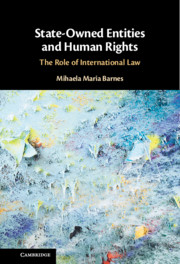Book contents
- State-Owned Entities and Human Rights
- State-Owned Entities and Human Rights
- Copyright page
- Dedication
- Contents
- Figures
- Foreword
- Acknowledgements
- Table of Cases
- Table of Treaties
- Table of Statutes and Statutory Instruments
- Abbreviations
- 1 Introduction to the Human Rights Dimension of State Corporate Ownership
- 2 State-Owned Entities as a Sui Generis ‘Participant’ in International Law
- 3 State-Owned Entities and Norm Development in International Law
- 4 Fundamental Change in International Law
- 5 The Continued Relevance of General International Law
- 6 Concluding Remarks
- Bibliography
- Index
1 - Introduction to the Human Rights Dimension of State Corporate Ownership
Published online by Cambridge University Press: 25 November 2021
- State-Owned Entities and Human Rights
- State-Owned Entities and Human Rights
- Copyright page
- Dedication
- Contents
- Figures
- Foreword
- Acknowledgements
- Table of Cases
- Table of Treaties
- Table of Statutes and Statutory Instruments
- Abbreviations
- 1 Introduction to the Human Rights Dimension of State Corporate Ownership
- 2 State-Owned Entities as a Sui Generis ‘Participant’ in International Law
- 3 State-Owned Entities and Norm Development in International Law
- 4 Fundamental Change in International Law
- 5 The Continued Relevance of General International Law
- 6 Concluding Remarks
- Bibliography
- Index
Summary
The chapter introduces State-owned entities (SOEs) and frames the reminder of the monograph. This chapter also provides the necessary definitions and carves out the monograph's sphere of applications to entities such as state-owned multinational enterprises, state-owned enterprises, national oil companies, sovereign wealth funds, export credit agencies and other types of entities that are State-owned. A short history of the State as an economic actor follows next then the focus turns to some of the traditional concerns associated with SOEs such as unfair competition, national security and resource security. The discussion then moves on to address the human rights dimension of State corporate ownership. Several case studies demonstrate concretely how SOEs become involved in human rights violations. The last section of this chapter provides an overview of human rights in international law, the most fundamental human rights instruments, a general introduction to the 'respect, protect and fulfil' framework, the nature of State's obligations to 'respect, protect and fulfil' human rights and the relationship between international law, human rights and State ownership.
Keywords
- Type
- Chapter
- Information
- State-Owned Entities and Human RightsThe Role of International Law, pp. 1 - 49Publisher: Cambridge University PressPrint publication year: 2021

